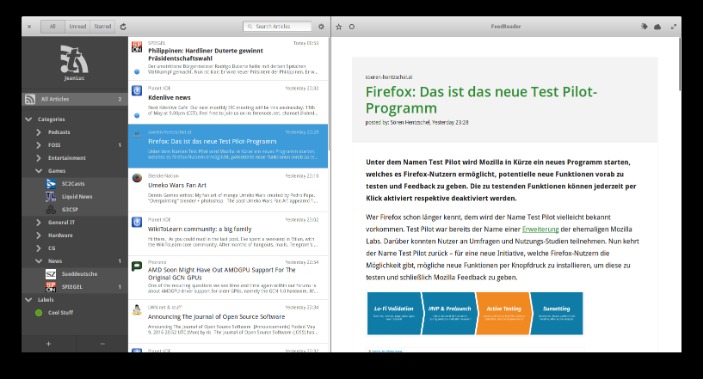Emerging Trends in Business Technology
In today’s rapidly evolving landscape, emerging trends in business technology are redefining how companies operate and compete. From advanced artificial intelligence to innovative cloud solutions, these technological breakthroughs are driving efficiency, enhancing customer experiences, and opening new opportunities for growth. Staying informed about these trends is essential for businesses aiming to stay ahead in a competitive market.
Artificial Intelligence and Machine Learning Advancements
Emerging trends in business technology today highlight the rapid advancement of artificial intelligence and machine learning, transforming how companies operate and compete. AI-driven tools are increasingly integrated into customer service, predictive analytics, and automation processes, leading to enhanced efficiency and personalized experiences. Machine learning algorithms are becoming more sophisticated, enabling businesses to extract valuable insights from large datasets and make data-driven decisions faster. Additionally, developments in natural language processing are improving communication interfaces, allowing for more intuitive human-computer interactions. As these technologies evolve, organizations are focusing on ethical AI practices and investing in innovative solutions to gain a competitive edge in the dynamic digital landscape.
Blockchain Adoption in Business Operations
Emerging trends in business technology are significantly shaping the way companies operate and compete in the modern marketplace. One of the most influential developments is the widespread adoption of blockchain technology, which is transforming business operations across various sectors. Blockchain offers enhanced transparency, security, and decentralization, making it ideal for applications such as supply chain management, financial transactions, and digital identity verification.
Many businesses are integrating blockchain to improve workflow efficiency and reduce fraud risks. For instance, supply chain companies are leveraging blockchain to trace products seamlessly from origin to consumer, ensuring authenticity and compliance. Financial institutions are using blockchain for faster, more secure transactions that eliminate the need for intermediaries. Additionally, blockchain-based smart contracts are automating agreements, reducing manual intervention, and increasing overall operational speed.
As blockchain technology continues to evolve, it is expected to become a core component of digital transformation strategies. Companies that adopt blockchain early can gain competitive advantages through improved efficiency, trust, and data integrity. Overall, the integration of blockchain into business operations marks a pivotal shift toward more secure, transparent, and efficient enterprise ecosystems.
5G Integration and Impact on Communication
Emerging trends in business technology are significantly transforming how companies communicate and operate, with 5G integration playing a pivotal role. The deployment of 5G networks offers faster data transmission, lower latency, and increased connectivity, enabling businesses to enhance communication efficiency and support innovative applications.
- Enhanced Connectivity and Speed: 5G allows real-time communication, supporting high-bandwidth applications such as video conferencing, cloud services, and IoT devices.
- Improved Remote Collaboration: Seamless and reliable connections facilitate remote work, virtual meetings, and instant data sharing across teams worldwide.
- Support for IoT and Smart Business Solutions: 5G enables a massive number of IoT devices to communicate simultaneously, leading to smarter supply chains, automation, and predictive analytics.
- Impact on Customer Engagement: Businesses can leverage 5G-powered AR and VR experiences to engage customers more interactively and personally.
- Security and Data Management Challenges: As connectivity expands, managing cybersecurity risks and data privacy becomes increasingly critical for businesses.
Overall, 5G integration is revolutionizing communication in the business landscape, fostering innovative services, improving operational efficiency, and opening new avenues for growth.
Edge Computing Expansion
Emerging trends in business technology are shaping the future of industries at an unprecedented pace. One of the most significant developments is the expansion of edge computing, which allows data processing to occur closer to the source of data generation. This shift reduces latency, improves real-time decision-making, and enhances overall system efficiency. As more organizations adopt Internet of Things devices and automation tools, edge computing becomes critical for managing massive volumes of data swiftly and securely. Additionally, advancements in 5G connectivity further accelerate the deployment of edge solutions, enabling faster data transfer and supporting innovative applications across various sectors. Overall, these trends highlight a move towards more decentralized, responsive, and intelligent business infrastructures driven by cutting-edge technology advancements.
Major Technology Announcements
Stay informed with the latest developments in the world of business technology as major announcements continue to reshape the industry. From groundbreaking product launches to strategic acquisitions, these advancements highlight the rapid pace of innovation driving digital transformation. Keeping up with these updates is essential for understanding how technology is influencing business strategies and marketplace dynamics today.

New Cloud Platform Launches
Today’s business technology news highlights several major announcements and new cloud platform launches that are shaping the industry. These developments are set to enhance enterprise capabilities, improve scalability, and drive innovation across various sectors.
- Apple introduced its latest cloud-based services, focusing on increased security and seamless integration with existing ecosystems.
- Google launched a new cloud platform featuring advanced AI-driven data analytics tools aimed at enterprises seeking to optimize operations.
- Microsoft unveiled a comprehensive update to its Azure cloud platform, emphasizing hybrid cloud solutions and enhanced developer support.
- Amazon Web Services announced the launch of a next-generation cloud infrastructure designed to deliver increased performance and cost efficiency.
- IBM revealed a new suite of cloud services tailored for industries such as healthcare and finance, emphasizing data privacy and compliance.
Innovations in Cybersecurity Solutions
Recent advancements in cybersecurity solutions are transforming the landscape of digital protection for businesses worldwide. Major technology announcements this year have introduced innovative tools designed to counter evolving cyber threats and enhance organizational security frameworks.
- Implementation of AI-powered threat detection systems capable of identifying zero-day vulnerabilities in real-time.
- Introduction of zero-trust security models that eliminate implicit trust within networks, reducing the risk of insider threats.
- Deployment of blockchain-based identity management solutions to ensure secure and transparent user authentication processes.
- Advancements in biometric authentication methods, including multi-factor verification with facial and fingerprint recognition.
- Integration of cloud security solutions that offer comprehensive protection across hybrid cloud environments, simplifying management and improving scalability.
Revolutionary Software Tools Unveiled
Today’s business technology news highlights several major announcements and revolutionary software tools that are set to transform industries worldwide. Industry leaders unveiled innovative technologies designed to enhance efficiency, security, and user experience across various sectors.
One of the most significant announcements includes the launch of a next-generation AI-driven platform aimed at streamlining business operations and data analytics. This tool leverages advanced machine learning algorithms to provide real-time insights, enabling companies to make more informed decisions swiftly. Additionally, a groundbreaking cloud-based software suite was introduced, offering seamless collaboration and remote work capabilities that cater to the evolving needs of modern enterprises.
In the realm of cybersecurity, new protective measures and software solutions were revealed, emphasizing enhanced threat detection and prevention mechanisms. These revolutionary tools utilize artificial intelligence to anticipate and neutralize potential security breaches before they occur, ensuring greater safety for corporate data.
Furthermore, several hardware advancements paired with sophisticated software interfaces were announced, promising faster processing speeds and improved connectivity. These innovations are expected to support upcoming digital transformation initiatives and foster smarter, more agile business environments.
Industry-Specific Tech Developments
Industry-specific technological advancements continue to shape the landscape of modern business, driving efficiency, innovation, and competitive advantage. From manufacturing to healthcare, tailored solutions are revolutionizing traditional processes and opening new opportunities for growth. Staying informed about these developments is essential for businesses aiming to adapt and thrive in a rapidly evolving digital environment.
Finance Sector: Fintech Innovations
In the realm of business technology news today, the finance sector is experiencing a wave of fintech innovations that are transforming traditional banking and financial services. These developments include the rise of digital-only banks, blockchain-based transaction systems, and AI-powered financial analytics, all aimed at increasing efficiency, security, and customer experience. Moreover, the integration of biometric authentication and real-time payment processing continues to enhance the security and speed of financial transactions. As regulations evolve, fintech companies are also pioneering open banking solutions, enabling seamless data sharing and innovative product offerings. These industry-specific tech advancements are reshaping the landscape of finance, driving greater inclusivity and pushing the boundaries of what digital financial services can achieve.
Retail Sector: Digital Shopping Experiences

Industry-specific technological advancements are transforming the retail sector by enhancing digital shopping experiences. Retailers are increasingly adopting augmented reality (AR) and virtual reality (VR) to enable customers to visualize products in their home environment or try on virtual clothing, creating immersive and personalized shopping journeys. Additionally, artificial intelligence (AI) and machine learning are being utilized to offer tailored product recommendations, streamline inventory management, and optimize supply chain operations. The integration of omnichannel strategies, supported by advanced analytics and seamless online-offline connectivity, allows consumers to shift effortlessly between digital and physical shopping platforms. These innovations not only improve customer engagement and satisfaction but also drive sales and operational efficiency in a highly competitive market. As technology continues to evolve, the retail sector is set to deliver more innovative digital experiences that meet the changing expectations of modern shoppers.
Healthcare: Telemedicine and Data Management
In the realm of healthcare, recent industry-specific technological advancements are transforming patient care and operational efficiency. Telemedicine has become increasingly prevalent, allowing patients to consult with healthcare providers remotely, which enhances accessibility and reduces costs. Advanced data management systems are now being implemented to securely store, analyze, and share vast amounts of medical information, improving diagnosis accuracy and treatment personalization. These innovations are driving a more connected, efficient, and patient-centered healthcare environment.
Corporate Tech Investments and Partnerships
Corporate Tech Investments and Partnerships play a vital role in shaping the future of business technology today. As companies seek innovative solutions and competitive advantages, strategic collaborations and investments in emerging technologies become crucial. These efforts drive digital transformation, enhance operational efficiency, and foster growth across various industries.
Major Mergers and Acquisitions
Corporate tech investments and partnerships continue to shape the landscape of business technology today, driving innovation and competitive advantage across industries. Major mergers and acquisitions are frequently orchestrated to enhance capabilities, expand market share, and accelerate digital transformation efforts. Recent trends indicate a focus on strategic collaborations between tech giants and emerging startups to foster emerging technologies such as AI, cloud computing, and cybersecurity. These developments not only reflect the dynamic nature of the tech sector but also highlight the importance of proactive investment and alliance strategies for sustainable growth in the fast-evolving digital economy.
Strategic Alliances for Innovation
Corporate tech investments and strategic partnerships play a vital role in shaping the landscape of innovation within the business technology sector today. Companies are increasingly leveraging alliances to access new technologies, share resources, and accelerate development cycles, thereby maintaining a competitive edge in rapidly evolving markets. These collaborations often involve joint ventures, co-development agreements, and technology-sharing arrangements that foster a culture of innovation and adaptability. By forging strategic alliances, organizations can tap into external expertise, diversify their technological capabilities, and respond more agilely to emerging trends such as artificial intelligence, cloud computing, and cybersecurity advancements. As technology continues to evolve at a breakneck pace, strategic partnerships are becoming essential for companies aiming to lead rather than follow in the digital age.
Venture Capital Funding in Tech Startups
Corporate tech investments and partnerships play a crucial role in shaping the landscape of the tech industry today. Companies are increasingly collaborating and investing in innovative startups to stay competitive and drive technological advancement.
- Major corporations are forming strategic alliances with emerging tech startups to access new markets and cutting-edge innovations.
- Venture capital funding continues to pour into tech startups, fueling rapid growth and product development.
- Recent partnerships include collaborations between AI firms and established tech giants to develop advanced machine learning solutions.
- Venture capitalists are prioritizing investments in sectors like AI, cybersecurity, and blockchain technology.
- The trend of corporate investments indicates a shift toward open innovation and shared growth opportunities in the tech ecosystem.
Regulatory and Policy Updates
Staying informed about regulatory and policy updates is crucial for businesses navigating the rapidly evolving technology landscape. These changes can significantly impact operations, compliance requirements, and strategic planning. In today’s fast-paced business technology news, understanding the latest developments helps organizations adapt effectively and maintain a competitive edge in a global market.
Data Privacy Regulations
Recent updates in regulatory and policy frameworks are significantly impacting the landscape of data privacy regulations worldwide. Businesses must stay informed about evolving standards such as the General Data Protection Regulation (GDPR) in the European Union and the California Consumer Privacy Act (CCPA) in the United States. These regulations aim to enhance consumer rights, enforce stricter data handling practices, and impose substantial penalties for non-compliance. Consequently, organizations are investing in advanced data governance strategies and privacy-preserving technologies to ensure compliance and maintain customer trust. The ongoing development of data privacy laws reflects a global shift towards greater accountability and transparency in data management, shaping the future of business technology operations.
Tech Industry Compliance Standards
Recent developments in regulatory and policy updates are significantly impacting the tech industry, emphasizing the importance of compliance standards. Governments worldwide are implementing new regulations aimed at enhancing data privacy, cybersecurity, and consumer protection, which require technology companies to adapt swiftly. Industry compliance standards such as GDPR, CCPA, and ISO 27001 are evolving to address emerging challenges, pushing organizations to prioritize secure data management and transparency. Staying ahead in business technology today necessitates a thorough understanding of these regulatory changes and adherence to updated standards to ensure legal compliance and maintain consumer trust.
Government Initiatives Supporting Tech Growth
Recent regulatory and policy updates have significantly influenced the landscape of technological growth, fostering an environment conducive to innovation and enterprise expansion. Governments worldwide are implementing new initiatives to support tech startups and established companies, streamlining compliance processes and reducing barriers to entry. These policies often include incentives such as tax breaks, grants, and funding programs aimed at advancing research and development. Additionally, regulatory frameworks are evolving to better address emerging technologies like artificial intelligence, blockchain, and 5G, ensuring both innovation and safety. Such government-led efforts are crucial in driving sustainable growth and maintaining competitive advantage in the rapidly changing technology sector.
Technological Challenges and Solutions
In today’s rapidly evolving digital landscape, businesses face numerous technological challenges that impact their operations and growth. From cybersecurity threats to integrating innovative systems, companies must find effective solutions to stay competitive. Addressing these challenges requires a strategic approach, leveraging advanced technologies and staying abreast of current trends in business technology. This article explores the key challenges and potential solutions shaping the future of business technology today.
Addressing Cybersecurity Threats
In today’s rapidly evolving business technology landscape, addressing cybersecurity threats remains a crucial challenge. Organizations face increasingly sophisticated hacking techniques, malware, and data breaches that threaten sensitive information and operational continuity. To combat these threats, companies are adopting advanced solutions such as multi-factor authentication, encryption protocols, and real-time threat detection systems. Additionally, implementing comprehensive cybersecurity strategies, including regular employee training and vulnerability assessments, helps mitigate risks. Emphasizing a proactive approach to security enhances resilience against cyberattacks and ensures that business technologies remain protected in an era of persistent digital threats.
Overcoming Infrastructure Limitations
In today’s rapidly evolving business technology landscape, overcoming infrastructure limitations is a significant challenge that companies face. These limitations can hinder the deployment of innovative solutions and limit overall operational efficiency. However, there are several strategies and solutions that organizations can adopt to address these issues effectively.
- Investing in cloud computing allows businesses to scale their infrastructure dynamically, reducing the need for extensive physical hardware.
- Implementing edge computing can help process data closer to its source, minimizing latency and reducing the load on central infrastructure.
- Adopting hybrid cloud models provides flexibility by combining on-premises resources with cloud services, optimizing resource utilization.
- Enhancing network infrastructure with higher bandwidth and more reliable connections ensures seamless connectivity and supports advanced applications.
- Leveraging infrastructure-as-code tools automates deployment and management, enabling rapid scalability and reducing human error.
- Partnering with managed service providers can supplement internal capabilities, offering expert support and access to advanced infrastructure.
By strategically investing in modern technologies and adopting flexible infrastructure models, businesses can overcome traditional limitations, ensuring continued growth and competitiveness in the digital age.
Scaling Tech in Large Organizations
Scaling technology in large organizations presents several unique challenges, including maintaining system stability, ensuring data security, and managing complex integrations across departments. As organizations grow, their existing infrastructure may struggle to support increasing demand, leading to performance issues and potential downtime. Additionally, integrating new solutions with legacy systems often proves difficult, risking data silos and operational inefficiencies. Addressing these issues requires a strategic approach to technology deployment and management.
One effective solution is adopting cloud-based infrastructure, which offers scalability, flexibility, and cost-efficiency. Cloud platforms enable organizations to dynamically adjust resources based on demand, reducing the risk of outages and optimizing performance. Implementing microservices architecture also helps break down monolithic systems into smaller, manageable components, facilitating easier updates and maintenance. Furthermore, adopting robust cybersecurity measures and regular training ensures data security as organizations expand their digital footprint.
Leveraging automation tools and artificial intelligence can streamline operations, reduce manual effort, and enhance decision-making processes. Additionally, fostering a culture of continuous innovation and collaboration among IT teams ensures that the organization stays agile and responsive to emerging technological trends. By combining these strategies, large organizations can effectively overcome technological challenges and scale their operations smoothly, ensuring sustained growth and competitive advantage in today’s fast-paced business environment.




